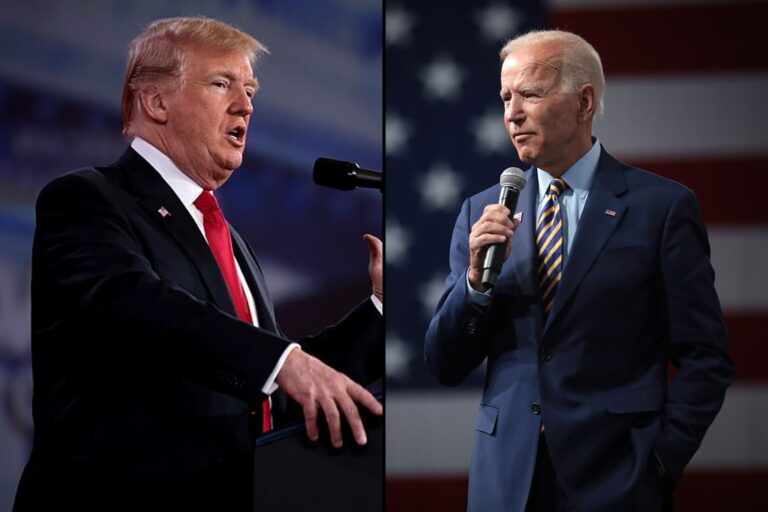
We’re Curious…
Where do President Donald Trump and former Vice President Joe Biden stand on Israel and other issues that affect the Jewish community? As Jewish educators, should we engage our students in discussions about national elections, and, if so, what is the best way to do so?
In the breakdown of the candidates’ positions that follows, we hope to shed light on the differences and similarities in their views on these particular issues, as part of the full range of issues that Jewish voters may consider.
Embassy Move
In December 2017, Trump announced the U.S. would officially recognize Jerusalem as the capital of Israel and move the United States embassy from Tel Aviv to the Holy City. The embassy was officially relocated in May 2018.
Announcing the decision, Trump said: “Israel is a sovereign nation with the right like every other sovereign nation to determine its own capital. Acknowledging this as a fact is a necessary condition for achieving peace.”
Biden has said he disagreed with the move and that it only should have happened in the context of the peace process. However, now that it has been done, Biden would not move the embassy back to Tel Aviv.
Annexation and Settlements
Biden opposes Israel expanding settlements and annexing West Bank territory. During a fundraiser with members of the American Jewish community earlier this year, he said: “Israel needs to stop the threats of annexation and stop settlement activity because it will choke off any hope of peace.” However, Biden said he would “not place conditions on security assistance given the serious threat Israelis face,” noting that “his commitment to Israel is unshakable.”
In November 2019, the Trump administration softened the United States’ stance on Israeli settlements, concluding that “the establishment of Israeli civilian settlements in the West Bank is not, per se, inconsistent with international law.” This represented a shift in the United States’ general approach toward the controversial subject since 1978.
Despite this reversal in policy and the fact that Trump’s peace plan allowed Israel to annex parts of the West Bank, the White House subsequently cooled its stance toward Israel carrying out this move. Israel’s annexation plans are currently suspended as part of the normalization agreement with the UAE.
Israeli-Palestinian Peace Process
In January 2020, Trump unveiled his plan for Israeli-Palestinian peace. Among other key points, the proposal envisioned Jerusalem as Israel’s undivided capital and allowed Israel to annex parts of the West Bank. At a joint briefing at the White House with Prime Minister Benjamin Netanyahu, Trump said: “My vision presents a win-win opportunity for both sides — a realistic two-state solution that resolves the risk of Palestinian statehood to Israel’s security.”
Biden strongly criticized the proposal following its release: “A peace plan requires two sides to come together. This is a political stunt that could spark unilateral moves to annex territory and set back peace even more. I’ve spent a lifetime working to advance the security & survival of a Jewish and democratic Israel. This is not the way.”
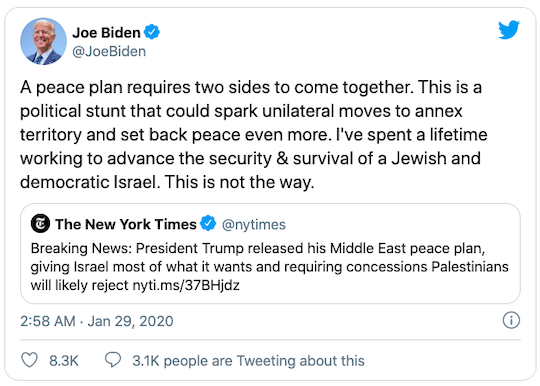
According to his campaign website, Biden favors “a negotiated two-state outcome” to the conflict. As president, he would “avoid actions, such as unilateral annexation of territory and settlement activity, or support for incitement and violence, that undercut prospects for peace between the parties.”
He has also said: “I believe a two-state solution is the only path to long-term security for Israel, while sustaining its identity as a Jewish and democratic state. It is also the only way to ensure Palestinian dignity and their legitimate interest in national self-determination.”
Both candidates have expressed strong support for Israel’s right to defend itself:
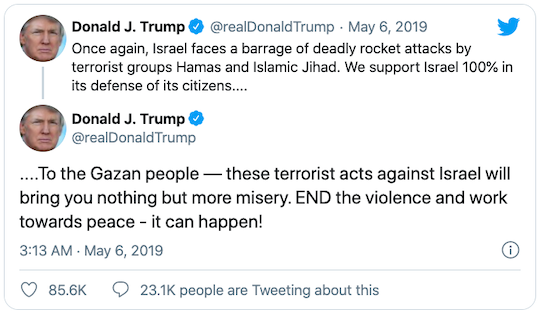

Normalization Agreements
Last month, Netanyahu and the foreign ministers from Bahrain and the UAE gathered in Washington at the White House with President Trump to sign historic normalization agreements. Coming 26 years after the last peace agreement between Israel and an Arab state, the deals were a remarkable achievement for the Trump administration.
At the signing ceremony, Trump declared: “After decades of division and conflict, we mark the dawn of a new Middle East… These agreements prove that the nations of the region are breaking free from the failed approaches of the past. Today’s signing sets history on a new course. And there will be other countries very, very soon that will follow these great leaders.”
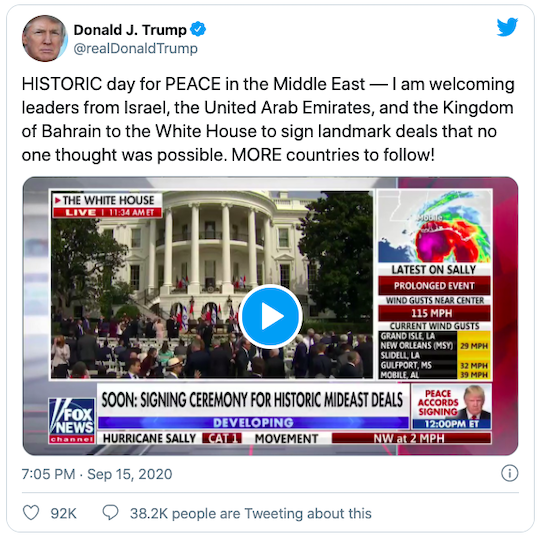
Biden released the following statement on the agreements: “I welcome the United Arab Emirates and Bahrain taking steps to normalize ties with Israel. It is good to see others in the Middle East recognizing Israel and even welcoming it as a partner. A Biden-Harris administration will build on these steps, challenge other nations to keep pace, and work to leverage these growing ties into progress toward a two-state solution and a more stable, peaceful region.”
Iran Deal
As vice president, Biden was part of the Obama administration that negotiated and implemented the 2015 Iran nuclear deal, formally known as the Joint Comprehensive Plan of Action (JCPOA). Supporters hoped the deal would limit Iran’s nuclear program and prevent it from developing nuclear weapons.
The Iran deal was overwhelmingly unpopular with both Israeli politicians and citizens. Months before it was announced, Netanyahu traveled to the U.S. and gave a controversial speech before Congress in which he said he opposed the deal because “it doesn’t block Iran’s path to the bomb; it paves Iran’s path to the bomb.”
In May 2018, Trump announced the U.S. was leaving the deal, arguing that Iran continued to pose a threat to the U.S. and that the deal did not ensure against Iran obtaining a nuclear weapon. Since then, the Trump administration has imposed crushing sanctions on Iran, but this has not stopped Iran’s pursuit of nuclear weapons. According to the U.N. nuclear watchdog, Iran currently has more than 10 times the amount of enriched uranium allowed under the agreement.
If elected, Biden would rejoin the JCPOA if Iran returns to strict compliance. He has criticized Trump for “putting Israel in danger by tearing up the Iran nuclear deal and replacing it with nothing.” Trump said he would seal a new agreement with Iran “within four weeks” if he is reelected.
BDS
Both candidates oppose the boycott, divestment and sanctions (BDS) campaign against Israel. Addressing Jewish donors at the Israeli-American Council National Summit last December, Trump said: “Make no mistake, radical lawmakers who support the BDS movement are advancing anti-Israel and anti-Semitic propaganda.” The president was referring to Ilhan Omar, Rashida Tlaib and other members of Congress who voted against condemning BDS.
Trump added: “My administration strongly opposes this despicable rhetoric, and as long as I am your president, it makes no difference, it is not happening.”
In his JTA op-ed detailing his plan to combat antisemitism, Biden wrote: “The calls here in the United States to boycott, divest from, and sanction Israel are wrong. Period. The BDS movement singles out Israel — home to millions of Jews — in a way that is inconsistent with the treatment of other nations, and it too often veers into anti-Semitism, while letting Palestinians off the hook for their choices.”
Antisemitism
According to the Anti-Defamation League (ADL), the American Jewish community experienced the highest level of antisemitic incidents in 2019 since the organization began tracking these incidents in 1979. Between 2016 and 2017, the number of antisemitic incidents jumped 57 percent; this represented the largest annual increase that the ADL has ever recorded.
In an op-ed published by JTA in January, Biden said his approach to combating antisemitism would “take seriously both the violence that accompanies it and the hateful and dangerous lies that undergird it. He argued: “Silence is complicity, so we must speak out — every time. We must call hate by its proper name, and condemn it.”
Biden’s plan also includes increased funding for addressing domestic extremism, working for legislation to combat domestic terrorism and prioritizing the prosecution of hate crimes, as outlined on his website.
In 2014, as vice president, Biden said on Twitter: “There is no threat that worries me more than the rising tide of anti-Semitism. There can be no tolerance for anti-Semitism.”
For Trump’s part, last December, the president signed an executive order that reinterpreted Title VI of the Civil Rights Act — which prohibits discrimination on the basis of race and nationality in educational institutions — as protecting from antisemitism. The order, which received mixed reactions from the American Jewish community, also called on agencies enforcing Title VI to use the International Holocaust Remembrance Alliance definition of antisemitism.
In April, marking Jewish American Heritage Month, Trump said: “Hatred is intolerable and has no place in our hearts or in our society. We must therefore vigorously confront anti-Semitic discrimination and violence against members of the Jewish community.”
However, the president has been accused of making antisemitic remarks and emboldening white supremacists. He claimed there were “very fine people on both sides” of clashes at a white supremacist rally in Charlottesville, Virginia, in 2017, provoking condemnation from many Jewish organizations. Trump has also been accused of invoking the antisemitic trope that Jews have “dual loyalty,” saying in August 2019: “If you want to vote Democrat, you are being very disloyal to Jewish people and very disloyal to Israel.” He also deflected a question about whether he would condemn white supremacists, who are antisemitic, during the recent debate.
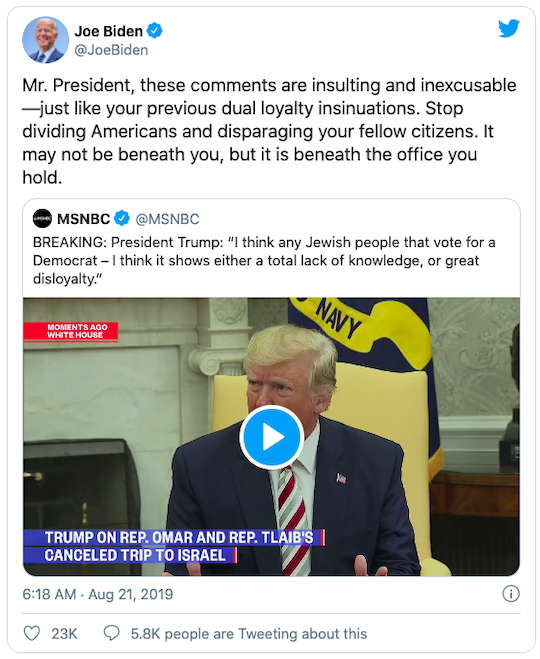
What Does “Pro-Israel” Mean Anyway?
We have all likely heard this debate being framed in terms of which candidate is more pro-Israel. This term is deeply fraught. Both J Street and AIPAC describe themselves as “pro-Israel”: J Street is “the political home for pro-Israel, pro-peace Americans,” and AIPAC is “America’s pro-Israel lobby.” Yet, the two organizations took different stances when it came to Trump’s peace plan, the Iran Deal and speaking at the AIPAC conference with Netanyahu.
Similarly, the columnist Caroline Glick called Trump “the most pro-Israel president in US history,” while Nadav Tamir argued that his policies “have been severely detrimental” to the Jewish state and are not “pro-Israel.”
So, what does this term mean, and should we be using it?
David Shipler, the former New York Times Jerusalem bureau chief, said in 2012: “It seems obvious to say that being pro-Israel means supporting Israel’s survival, security and well-being as a just and prosperous society. Nobody would disagree.”
Eric Mandel, director of the Middle East Political Information Network, suggested a definition that includes: “being able to say the Land of Israel is the homeland of the Jewish people,” “that the state of Israel is entitled to exist as a Jewish and democratic state without qualifiers” and “not allying with anti-Israel organizations that question Israel’s right to exist.”
Hillel Schenker, co-editor of the Palestine-Israel Journal, argued that “seeking a negotiated peace, with security, based upon a viable two-state solution, a solution which is still possible, is what it means to be truly ‘pro-Israel.’”
Barack Obama has suggested the term should leave room for differences of opinion: “I think there is a strain within the pro-Israel community that says unless you adopt an unwavering pro-Likud approach to Israel that you’re anti-Israel, and that can’t be the measure of our friendship with Israel. If we cannot have an honest dialogue about ‘how do we achieve these goals,’ then we’re not going to make progress.”
Amanda Berman, executive director of the Zioness Movement, offered a different response altogether: We should be using the term “Zionist” instead of “pro-Israel.” According to Berman, while she understands why “pro-Israel” is used, the term is problematic because it is often misunderstood as connoting “anti-Palestinian.” She also argued that using the language “pro-Israel” has an unintentional effect of legitimizing being “anti-Israel,” noting that there is no such movement against other countries. Both what this term means and whether it should continue to be used is up for debate.
How Should We Discuss Elections With Our Students?
David Bryfman, CEO of the Jewish Education Project, recently argued that Jewish educators have a civic responsibility to engage their students in the critical political and social issues of our day. “For 21st century education to be relevant and meaningful, then it must empower our youth to be active and vibrant members of the societies in which they live,” he wrote in an op-ed.
He added: “The same holds for Jewish education. For Jewish education to be meaningful and relevant in today’s political climate, we must commit to applying our tradition and wisdom to the greater society in which we live.”
Particularly in such polarized times, engaging our students in conversations about sensitive topics presents us as educators with obvious challenges. What is the best approach? Here are three practical tips for addressing elections and other controversial issues with your students.
- Set ground rules in advance to create a respectful and productive conversation. As Bryfman points out, we should let our students know that the conversation is taking place “l’shem shamayim” (for the sake of the heavens). “In the spirit of Hillel and Shammai’s many disagreements, [the discourse] must occur with civility, respect, and without threat of violence or retribution.” This includes teaching our students that claims should be evidence-based and may be directed against opinions, but not against people.
- Discuss issues through the lens of Jewish values. Our Jewish values can help guide the decisions we make, including who we vote for. Give your students a list of Jewish values and ask them to identify the ones that are most important to them when considering the election or a particular issue. Then have your students share about how they apply those values to the topic at hand and why they are personally important.
- Practice empathy with your students. Prior to engaging in the conversation, help your students flex their empathy muscles by presenting one of the following scenarios:
- You walk into class five minutes late. How do you explain your actions (to yourself or teacher)? Your classmate walks into class 10 minutes late. How do you explain her actions (to yourself)? Is there a difference? Why?
- You’re finishing basketball practice when your coach snaps at you, but you feel you didn’t do anything wrong. What is your immediate reaction? How can you discuss with your coach and view him or her favorably?
The Bottom Line
When it comes to Iran, the Israeli-Palestinian peace process, and other issues that affect Israel and the Jewish world, President Trump and former Vice President Biden offer different policy visions. At the same time, both support expanding ties between Israel and the Arab world, and both oppose BDS. Given that the definition of the term “pro-Israel” is up for debate, neither candidate can truly claim to be the “pro-Israel” candidate. While addressing sensitive topics with our students is certainly challenging, facilitating respectful conversations — with the help of a few key strategies — can empower them to become more engaged citizens.
Originally Published Oct 12, 2020 03:07PM EDT


